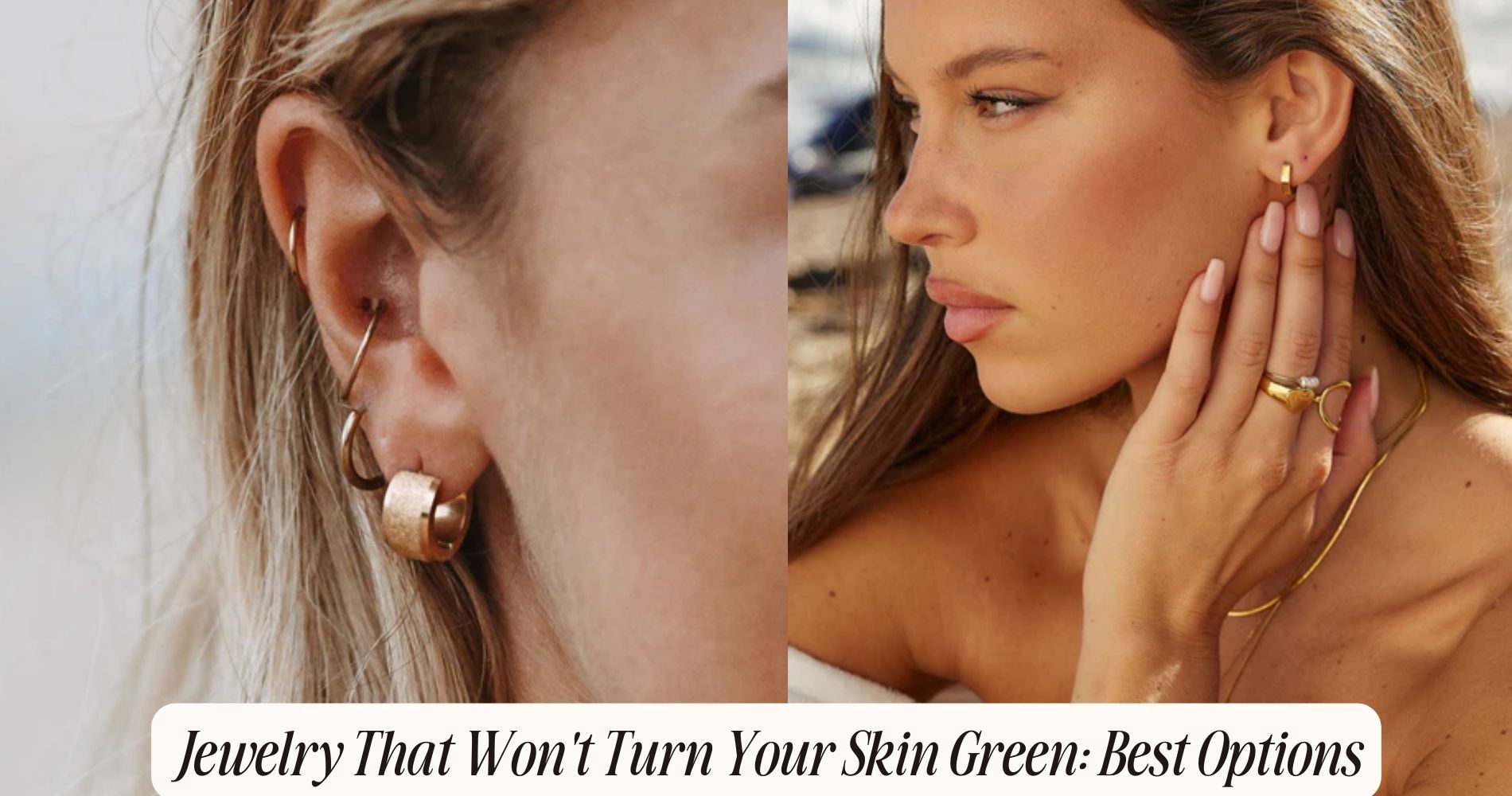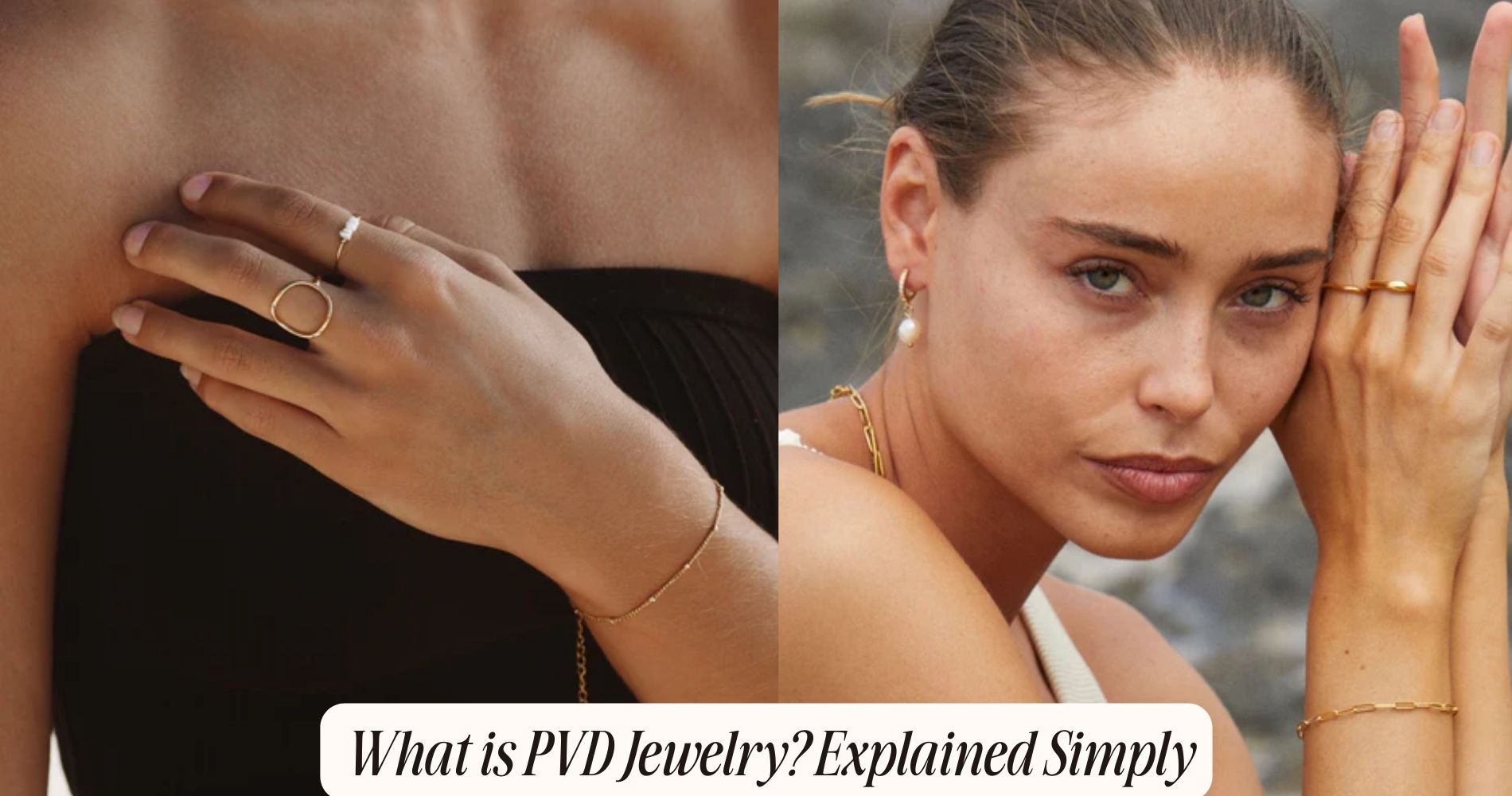
Jewelry That Won't Turn Your Skin Green: Best Options
Hypoallergenic Metals
Hypoallergenic metals, such as titanium and surgical stainless steel, are specifically engineered to minimize the risk of allergic reactions and guarantee long-term wearability. When you choose titanium alloys, you're investing in a material renowned for its exceptional biocompatibility. Titanium doesn't contain nickel, a common allergen, making it an ideal choice for sensitive skin. It's also incredibly durable and resistant to corrosion, ensuring that your jewelry maintains its luster over time.
Surgical steel, often utilized in medical applications, is another excellent hypoallergenic option. Specifically, grades like 316L and 316LVM are widely recognized for their hypoallergenic properties. These grades are low in nickel and feature a high level of chromium, which forms a passive oxide layer, preventing skin irritation. Surgical steel is also highly resistant to tarnish and rust, making it a reliable choice for everyday wear.
Gold Jewelry
Gold jewelry, with its timeless allure and inherent resistance to tarnish, offers both aesthetic appeal and functional benefits that make it a preferred choice for those seeking long-lasting, skin-friendly adornments. When considering gold jewelry, understanding karat purity is crucial.
Karat measures the proportion of pure gold mixed with other metals to create an alloy. Pure gold, or 24-karat gold, is highly resistant to corrosion and tarnish but is also quite soft, making it less ideal for everyday wear.
To enhance durability, jewelers often use gold alloys. Common alloys include 18-karat (75% pure gold) and 14-karat (58.3% pure gold). These mixtures incorporate metals like copper, silver, and nickel, which not only increase strength but also affect the color and hypoallergenic properties of the jewelry.
For instance, higher karat purity indicates a greater percentage of pure gold, reducing the likelihood of skin reactions and ensuring that the piece retains its luster over time.
Opt for pieces with higher karat ratings if you have sensitive skin. However, be aware that even high-karat gold can cause reactions if mixed with certain metals. Always verify the composition of gold alloys to guarantee compatibility with your skin type.
Stainless Steel
With its robust durability and resistance to tarnish, stainless steel jewelry stands out as a practical and stylish option for those seeking skin-friendly adornments. Stainless steel is a remarkable alloy composed primarily of iron, carbon, and chromium. The chromium component forms a passive layer that prevents oxidation, ensuring that your jewelry maintains its luster over time. This intrinsic resistance to tarnish is one of the primary durability benefits, ensuring your pieces remain as striking as the day you bought them.
Moreover, stainless steel's hypoallergenic properties make it an excellent choice for those with sensitive skin. Unlike other metals that can cause irritation, stainless steel is generally non-reactive, reducing the likelihood of skin discoloration or allergic reactions. This makes it an ideal everyday wear option.
Stainless steel offers affordable elegance without compromising on style or quality. Its versatility allows it to be fashioned into a variety of designs, from minimalist bands to intricate, ornate pieces. Additionally, its affordability doesn't detract from its premium appearance, making it accessible without sacrificing aesthetic appeal.
Whether you're looking for something casual or more sophisticated, stainless steel provides a myriad of choices that are both elegant and economically sensible.
Platinum Pieces
Platinum jewelry, known for its exceptional durability and luxurious sheen, offers a premium option for those seeking both elegance and skin-friendly attributes. Unlike other metals, platinum's dense composition guarantees it retains its luster and structural integrity over time, making it a preferred choice for heirloom pieces. Its impressive durability means that platinum can withstand daily wear without significant signs of wear and tear, ensuring longevity and minimal maintenance.
Platinum's wear resistance is another critical attribute that makes it stand out. It doesn't corrode or tarnish, even when exposed to various elements, including moisture and air, which are common culprits for skin discoloration in other metals. You won't have to worry about the metal degrading or reacting with your skin, thereby preventing the dreaded green stains.
Moreover, platinum's hypoallergenic properties make it an excellent choice for sensitive skin. It contains no nickel, often the cause of allergic reactions. This hypoallergenic nature, combined with its durability and wear resistance, guarantees that your platinum pieces remain pristine and irritation-free, even with continuous use.
Choosing platinum means investing in a metal that offers unmatched longevity, beauty, and peace of mind.
Rhodium-Plated Options
Opting for rhodium-plated jewelry can be an important solution to prevent skin discoloration while enhancing the brilliance and durability of your pieces. Rhodium, a rare and precious metal, is known for its exceptional resistance to tarnish and corrosion. When applied as a thin coating over other metals, such as silver or gold, it provides a lustrous, reflective finish that elevates the aesthetic appeal of your jewelry.
Rhodium durability is one of its most significant advantages. This metal's hardness ensures that your jewelry remains scratch-resistant and maintains its pristine appearance over time. However, it's essential to understand that rhodium plating isn't permanent. Over time, the plating may wear off, exposing the underlying metal. To prolong the life of your rhodium-plated pieces, regular plating care is important.
Avoid exposing your jewelry to harsh chemicals, including household cleaners and chlorine, which can erode the rhodium layer. Store your pieces in a cool, dry place, preferably in a soft pouch to prevent scratches.
Additionally, periodic re-plating by a professional jeweler can help maintain the integrity and shine of your rhodium-plated jewelry. By following these guidelines, you can enjoy the lasting beauty and functionality of your rhodium-plated pieces.
Frequently Asked Questions
Can Certain Gemstones Also Cause Skin Discoloration?
Yes, certain gemstones can cause skin discoloration due to their composition. Gemstone composition often includes trace elements that may trigger reactions, especially if you have nickel allergies, leading to skin irritation and discoloration.
How Should I Care for Non-Tarnishing Jewelry?
For non-tarnishing jewelry, maintain a cleaning routine using mild soap and water, followed by thorough drying. Implement storage tips like keeping pieces in a dry, airtight container to prevent exposure to humidity and pollutants.
Are There Any Home Remedies to Remove Green Stains From Skin?
Yes, you can remove green stains using lemon juice and baking soda. Apply lemon juice to the stained area, then gently scrub with a baking soda paste. The acidic and abrasive properties effectively eliminate discoloration.
What Are Some Signs of High-Quality, Non-Reactive Jewelry?
Look for signs of high-quality, non-reactive jewelry by examining its material composition. Hypoallergenic metals like titanium, platinum, and surgical-grade stainless steel guarantee durability and skin compatibility, preventing allergic reactions and discoloration.
Do Sweat and Humidity Affect Jewelry's Likelihood to Turn Skin Green?
Yes, sweat and humidity can increase the likelihood of jewelry turning your skin green. These factors cause metal allergies to flare up, particularly if the jewelry has high nickel content, which is a common irritant.
Conclusion
To sum up, opting for hypoallergenic metals for your jewelry helps prevent your skin from turning green. Choose gold, valued for its purity and low reactivity, or stainless steel, which provides durability and resistance to tarnishing.
Platinum pieces are another great option, valued for their hypoallergenic properties and strength. Additionally, consider rhodium-plated options to add a layer of protection and enhance durability.
By selecting these materials, you'll enjoy beautiful, long-lasting jewelry without compromising skin health.





















Leave a comment
This site is protected by hCaptcha and the hCaptcha Privacy Policy and Terms of Service apply.